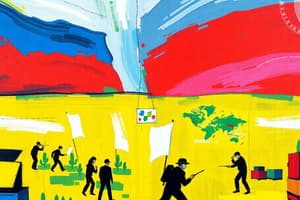Podcast
Questions and Answers
What is the study of the politics of international economic activities called?
What is the study of the politics of international economic activities called?
- International Political Economy (correct)
- Mercantilism
- Liberalism
- Marxism
What does mercantilism emphasize in international relations?
What does mercantilism emphasize in international relations?
Each state must protect its own interests at the expense of others.
Liberalism promotes the idea that states can mutually benefit from economic exchanges.
Liberalism promotes the idea that states can mutually benefit from economic exchanges.
True (A)
What is the concept of economic exploitation in relation to Marxism?
What is the concept of economic exploitation in relation to Marxism?
What is the definition of bargaining space?
What is the definition of bargaining space?
What does market price refer to?
What does market price refer to?
What are demand and supply curves related to?
What are demand and supply curves related to?
What is the balance of trade?
What is the balance of trade?
What is comparative advantage?
What is comparative advantage?
What does autarky refer to?
What does autarky refer to?
What is dumping in international trade?
What is dumping in international trade?
What is a tariff?
What is a tariff?
What are subsidies?
What are subsidies?
What is economic nationalism?
What is economic nationalism?
What is the World Trade Organization?
What is the World Trade Organization?
What does the Most Favored Nations Concept entail?
What does the Most Favored Nations Concept entail?
What is the Generalized System of Preferences?
What is the Generalized System of Preferences?
What are bilateral treaties?
What are bilateral treaties?
What is meant by free trade?
What is meant by free trade?
What is a cartel?
What is a cartel?
What is industrial policy?
What is industrial policy?
What are intellectual property rights?
What are intellectual property rights?
Study Notes
International Political Economy
- Examines the intersection of politics and economics at a global level, focusing on trade, monetary relations, and the role of multinational corporations.
Mercantilism
- Advocates for a state-centric approach emphasizing protection of national interests, prioritizing relative wealth over mutual advantages from international cooperation.
Liberalism
- Centers on cooperation to enhance collective economic benefits, highlighting the importance of international organizations in fostering trade and enhancing states' absolute wealth.
Marxism
- Views economic exploitation as the core determinant of political relationships and power dynamics within the international sphere.
Bargaining Space
- Defined as the range between the lowest acceptable price for sellers and the highest acceptable price for buyers in a transaction.
Market Price
- Refers to the price point where goods are sold consistently in the marketplace, leading to standardized pricing.
Curves
- Demand is inversely related to price: higher prices lead to lower demand. Conversely, supply is positively related to price: higher prices incentivize increased supply. The point where demand and supply intersect determines the equilibrium price.
Balance of Trade
- The comparative value of a state's imports against its exports. A trade surplus occurs when exports exceed imports, while a trade deficit arises when imports surpass exports.
Comparative Advantage
- Highlights disparities in production capabilities among states due to variations in resources, labor characteristics, technology, and other factors that determine efficiency.
Autarky
- Describes an economic system where a country minimizes or eliminates trading with others, aiming for complete self-sufficiency.
Dumping
- The practice of selling goods in a foreign market at prices lower than the domestic market or below production costs.
Tariff (Duty)
- A tax imposed on specific categories of imported goods as a means to protect domestic industries and generate revenue.
Subsidies
- Financial assistance provided by governments to domestic industries, enabling them to reduce prices without incurring losses through loans or tax exemptions.
Economic Nationalism
- Utilizes economic strategies to enhance a state's international power and status, reflecting a focus on national interests.
World Trade Organization (WTO)
- An international organization that regulates and facilitates global trade, managing trade agreements and resolving disputes among member states. It evolved from the General Agreement on Tariffs and Trade (GATT).
Most Favored Nations Concept
- Mandates that any trade advantages granted by a WTO member to one partner must also be extended to all WTO members, promoting non-discriminatory trade practices.
Generalized System of Preferences (GSP)
- An exception allowing developed nations to offer trade concessions to developing countries to support their economic growth and development.
Bilateral Treaties
- Agreements between two countries designed to create reciprocal trade benefits by reducing barriers to trade between them.
Free Trade
- An agreement aimed at eliminating most or all trade restrictions, as seen in trade pacts like NAFTA.
Cartel
- An association of producers or consumers forming a coalition to influence the pricing of a product, with OPEC being a notable example in the oil sector.
Industrial Policy
- A governmental strategy to actively support domestic industries through tailored trade policies and targeted assistance to foster growth.
Intellectual Property Rights
- Legal rights granted to creators of artistic and intellectual works, ensuring they receive royalties from the sale of their products, crucial for innovation and creative industries.
Studying That Suits You
Use AI to generate personalized quizzes and flashcards to suit your learning preferences.
Description
This quiz covers key concepts in International Political Economy, including mercantilism, liberalism, and Marxism. It explores the dynamics of global trade, monetary relations, and the influence of multinational corporations. Test your understanding of bargaining space and market price as well.




